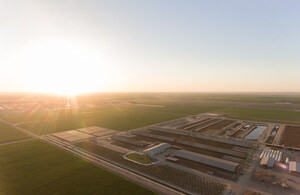
Report: Changing Manure Management Would Significantly Reduce Dairy Methane Emissions
EDF, Dairy Cares study is the most detailed "whole dairy" methane analysis ever conducted in California
SACRAMENTO, Calif., Oct. 16, 2018 /PRNewswire/ -- New research published in the Journal of Dairy Science finds that changing the way manure is stored and handled is key to meeting California's 40 percent dairy manure methane reduction goal and combating climate change.
With financial support from Environmental Defense Fund (EDF) and cooperation from the Dairy Cares coalition, leading scientists worked together to produce the most thorough, detailed measurements of "whole-dairy" methane emissions in California to date.
The results confirm that manure methane emissions come primarily from wet storage of manure, a valuable insight for measuring and controlling emissions of this potent greenhouse gas.
"This important work advances our understanding in two areas – how to accurately measure and estimate methane emissions from California, and how to control them," said Josette Lewis, associate vice president of sustainable agriculture at EDF. "This helps ensure our strategies for reducing these emissions remain on target, and that we can accurately assess our progress."
The study used a variety of methods, including instruments mounted in the ground and deployed in aircrafts and vehicles, to measure methane emissions at two Central Valley dairies. All methods produced similar measurements of whole-dairy emissions, increasing confidence in the results.
"Until now, relatively little research has been done to measure and pinpoint specific sources of methane emissions at dairies in California," said Michael Boccadoro, executive director of Dairy Cares. "It is important that we base our strategies on sound scientific measurements from California dairies, and not just on studies conducted in other states. This information is critical as the dairy community works with our partners, including EDF, the California Air Resources Board (CARB), the California Department of Food and Agriculture, and technology providers to reduce emissions in a cost-effective manner."
Other study findings include:
- Direct methane emissions from ruminating animals, such as cow digestive gases or burps, tend to remain steady year-round.
- Emissions from manure storage can be highly variable and weather dependent; they are three to six times higher in summer than in winter.
- Emissions differences between dairies appear to be linked to the amount of manure that is stored in anaerobic, or wet and airless, conditions.
Dr. Claudia Arndt, former Kravis postdoctoral fellow at EDF and current postdoctoral fellow at the Tropical Agricultural Research and Higher Education Center, led the research. The diverse research team included scientists from the U.S. Department of Agriculture's Agricultural Research Service, Penn State University, University of California, Davis, and Aerodyne Research, Inc.
"We attributed much of the difference in emissions between dairies to the proportion of manure stored in liquid form," Arndt said. "This suggests that reducing the amount of manure stored in that manner, or the length of time manure is stored in liquid form, could significantly reduce methane emissions."
Additional information
Dairy methane emissions contribute up to 5 percent of the state's carbon footprint. With a law passed in 2016, California became the first dairy region in the world to set a goal for a 40 percent reduction of methane emissions from dairy manure by 2030.
The state's current programs to incentivize emissions reductions target the exact emissions sources pinpointed by this study: liquid manure storage. California has made $260 million available for dairy methane reduction projects. These include digesters, which capture methane and convert it to clean renewable energy and fuel, and projects that change manure storage to avoid methane production from anaerobic conditions. Several additional CARB-funded studies are under way, including research to measure changes in emissions on dairies where methane reduction measures have been installed.
"Dairy Cares has always supported strong science to guide farmers in their efforts to improve environmental outcomes, and this research suggests the current strategies are right on target," Boccadoro said. "We were pleased to partner with EDF on this important work and gratified that the data supports the successful approach to use voluntary, incentive-based measures to achieve these reductions."
With continued funding through the Dairy Digester Research and Development Program, California is on its way to having 100 to 120 dairy digesters operating within the next four to five years. These digesters, one of California's most cost-effective climate investments, are capturing methane and creating clean, renewable energy.
The Alternative Manure Management Program (AMMP) has awarded funding to 58 dairy farms across the state. AMMP funds technologies and strategies to reduce the amount of manure solids stored in wet conditions. Funding covers manure solid separation, compost enhancement, and scrape and vacuum technologies. Ongoing research continues to verify and quantify how these technologies can reduce methane emissions while improving overall air and water quality.
Environmental Defense Fund (edf.org), a leading international nonprofit organization, creates transformational solutions to the most serious environmental problems. EDF links science, economics, law and innovative private-sector partnerships. Connect with us on Twitter, Facebook and our Growing Returns blog.
Dairy Cares (dairycares.com) is a statewide coalition with a mission to ensure the long-term sustainability of California's dairy farm families through strong environmental stewardship and responsible animal care. Members include California's farmer-owned milk cooperatives, privately owned milk processors and trade associations. Connect with us on Twitter and Facebook.
Contact:
Hilary Kirwan, (202) 572-3277, [email protected]
Jennifer Bingham, (916) 441-3318, [email protected]
SOURCE Dairy Cares





Share this article